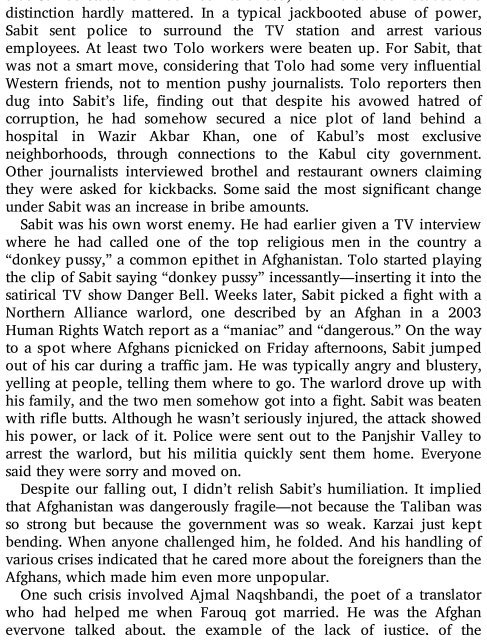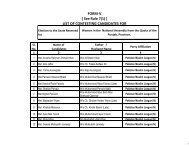the_taliban_shuffle_-_kim_barker
the_taliban_shuffle_-_kim_barker
the_taliban_shuffle_-_kim_barker
Create successful ePaper yourself
Turn your PDF publications into a flip-book with our unique Google optimized e-Paper software.
distinction hardly mattered. In a typical jackbooted abuse of power,<br />
Sabit sent police to surround <strong>the</strong> TV station and arrest various<br />
employees. At least two Tolo workers were beaten up. For Sabit, that<br />
was not a smart move, considering that Tolo had some very inuential<br />
Western friends, not to mention pushy journalists. Tolo reporters <strong>the</strong>n<br />
dug into Sabit’s life, nding out that despite his avowed hatred of<br />
corruption, he had somehow secured a nice plot of land behind a<br />
hospital in Wazir Akbar Khan, one of Kabul’s most exclusive<br />
neighborhoods, through connections to <strong>the</strong> Kabul city government.<br />
O<strong>the</strong>r journalists interviewed bro<strong>the</strong>l and restaurant owners claiming<br />
<strong>the</strong>y were asked for kickbacks. Some said <strong>the</strong> most signicant change<br />
under Sabit was an increase in bribe amounts.<br />
Sabit was his own worst enemy. He had earlier given a TV interview<br />
where he had called one of <strong>the</strong> top religious men in <strong>the</strong> country a<br />
“donkey pussy,” a common epi<strong>the</strong>t in Afghanistan. Tolo started playing<br />
<strong>the</strong> clip of Sabit saying “donkey pussy” incessantly—inserting it into <strong>the</strong><br />
satirical TV show Danger Bell. Weeks later, Sabit picked a ght with a<br />
Nor<strong>the</strong>rn Alliance warlord, one described by an Afghan in a 2003<br />
Human Rights Watch report as a “maniac” and “dangerous.” On <strong>the</strong> way<br />
to a spot where Afghans picnicked on Friday afternoons, Sabit jumped<br />
out of his car during a trac jam. He was typically angry and blustery,<br />
yelling at people, telling <strong>the</strong>m where to go. The warlord drove up with<br />
his family, and <strong>the</strong> two men somehow got into a ght. Sabit was beaten<br />
with rie butts. Although he wasn’t seriously injured, <strong>the</strong> attack showed<br />
his power, or lack of it. Police were sent out to <strong>the</strong> Panjshir Valley to<br />
arrest <strong>the</strong> warlord, but his militia quickly sent <strong>the</strong>m home. Everyone<br />
said <strong>the</strong>y were sorry and moved on.<br />
Despite our falling out, I didn’t relish Sabit’s humiliation. It implied<br />
that Afghanistan was dangerously fragile—not because <strong>the</strong> Taliban was<br />
so strong but because <strong>the</strong> government was so weak. Karzai just kept<br />
bending. When anyone challenged him, he folded. And his handling of<br />
various crises indicated that he cared more about <strong>the</strong> foreigners than <strong>the</strong><br />
Afghans, which made him even more unpopular.<br />
One such crisis involved Ajmal Naqshbandi, <strong>the</strong> poet of a translator<br />
who had helped me when Farouq got married. He was <strong>the</strong> Afghan<br />
everyone talked about, <strong>the</strong> example of <strong>the</strong> lack of justice, of <strong>the</strong>



